Does your vineyard or orchard need a Babydoll?
21st August 2024
Olde English ‘Babydoll’ Southdown sheep are one of the UK’s rarest sheep breeds – but for some vineyards and orchards around the world, they are making a comeback as an ‘eco-mower’. Sarah Kidby reports.
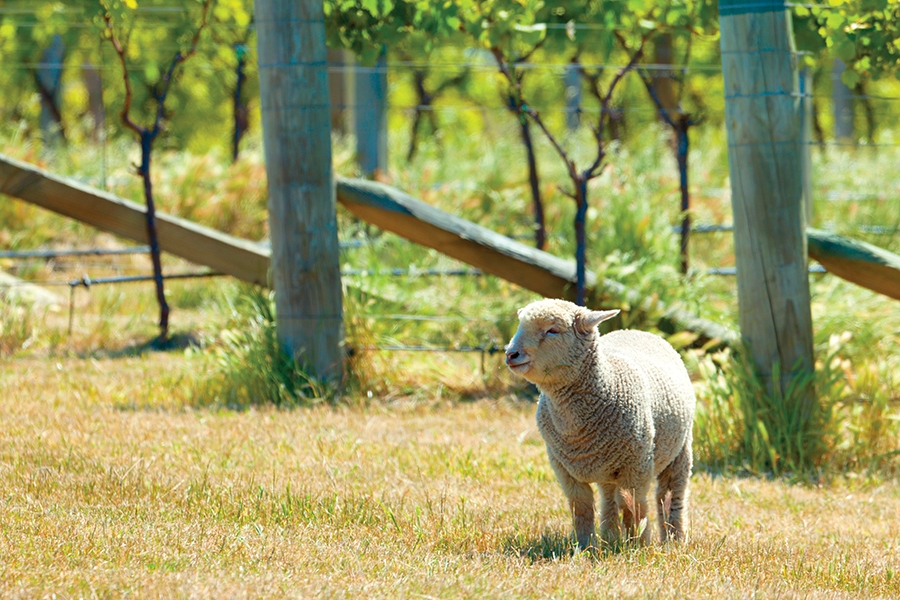
Earning its nickname from its ‘teddy bear-like’ appearance, the Babydoll breed dates back to the 1700s, on the South Down hills of Sussex.
There were once 100,000 ewes in England but World War I brought about a sharp decline in numbers and the breed was all but extinct by the end of WW2. This was down to demand for larger cuts of meat, which caused a split within the breed – between the original Olde English Babydoll and the larger, ‘leggier’ Southdown.
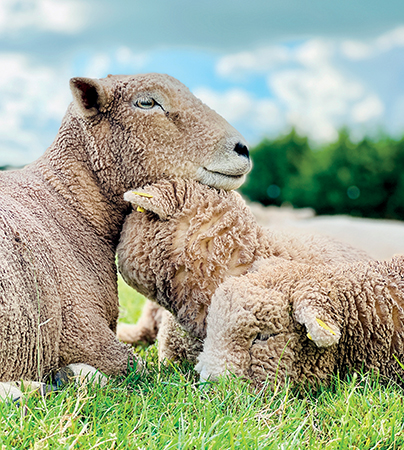
The traditional breed was reintroduced to the UK 20 years ago, but there are still fewer than 200 in the UK, and 400 in the whole of Europe.
Its miniature stature – measuring just 22 inches tall – may have been its undoing as a meat breed, but it makes the Babydoll ideal for vineyards and orchards, as the sheep are too small to reach the fruit.
Sheep offer a number of advantages in vineyards, especially those moving to regenerative practices, including eating weeds and ‘mowing’ between the vines, saving fuel, labour and herbicide use; as well as distributing free fertiliser. However, to prevent them eating the fruit, sheep are often only grazed from post-harvest to the pre-bud stage.
Heidi Bell, of Babydoll Sheep UK, is one of only eight Babydoll breeders in the UK, and keeper of the largest known UK flock – numbering 47 sheep. Keeping them on her own orchard, she says Babydolls are an efficient eco-mower and have an open, trusting nature that makes them easy to handle – with no need for a sheepdog.
Babydoll wine
One wine producer in New Zealand, meanwhile, has gone so far as to name a wine brand after this quirky breed. Using sheep to keep the vine rows tidy during the colder months is fairly common practice in New Zealand, but Yealands Wine Group, which makes Babydoll wine, believes it was the first – and only – vineyard to trial grazing Babydolls when the grapes are ripening.
The sheep are used for weed control and to keep the grass short over winter, reducing the number of passes with a tractor, and adding a dose of natural fertiliser to the mid-rows, which also improves soil quality.
In the warmer months, sheep are moved to the paddocks and cover crops and wildflowers are planted between the vines to help manage the vine rows (and reduce mechanical mowing).
Wildflowers have the added benefit of attracting beneficial insects for extra pest control. Whilst agreeing that Babydolls are easy to handle, the team said they do have a tendency to misbehave and get through the fences, however.
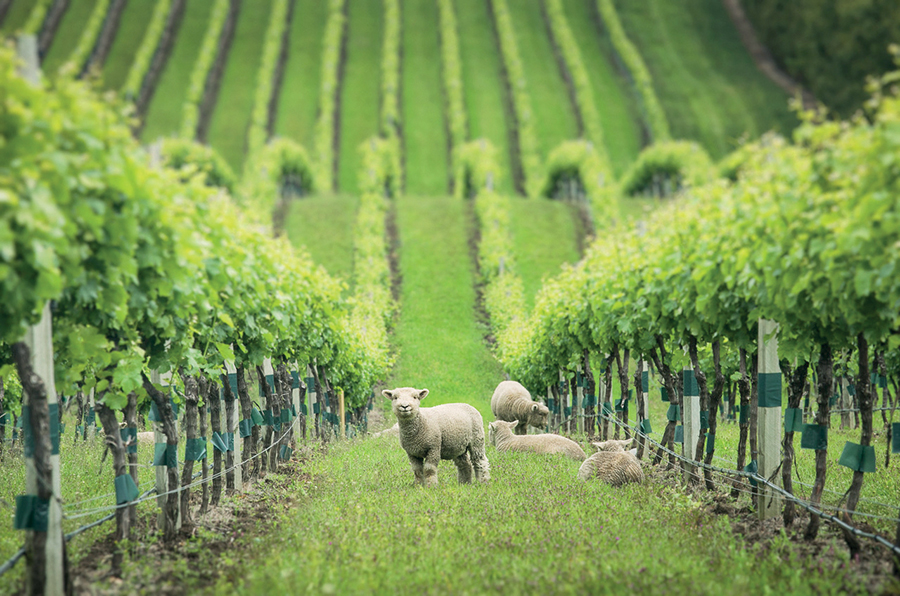
Saving costs and labour
Stephanie Helm runs a 6ha vineyard and winery called The Vintners Daughter in Canberra, Australia, with her husband Ben Osborne. They decided to bring sheep into the vineyard as they wanted to reduce their herbicide use, but specialised mowing equipment was outside their price range.
“Babydolls are perfect for vineyards due to their short necks, thick legs, solid body and gentle nature. Their build makes them unlikely to damage the vines, which means they can be used in the vineyard even during the growing season – and they also remove suckers from vine trunks,” Steph explained.
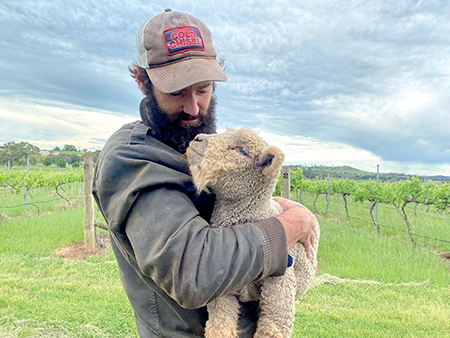
This has allowed them to cut back on fuel and labour costs. “We generally need to have teams of people debudding a few times a year but the sheep have eliminated the need for this labour.
“They also can work no matter the weather – this was very useful during a few back-to-back wet years where we weren’t able to drive a tractor into the vineyard without getting bogged.
“They also contribute to improving vineyard soil health by providing natural fertiliser and reducing the need for heavy machinery in the vineyard. This in turn leads to less soil compaction, improved soil fertility and structure, and healthier grapevine growth.”
With a docile temperament, the sheep haven’t caused any problems with breaking infrastructure like vines, irrigation or trellises, and they seem to have little interest in eating bark. However, Steph advises only using them in established vineyards.
Tourism and staff wellbeing have also seen a boost since the sheep were brought in. “They are very cute and people love seeing them in the vineyard. We know each and every one of them on sight by name, they are very friendly and love a pat – so they’ve been great for our own mental health and happiness too,” she added.

Things to consider
With Babydolls being a rare breed globally, Steph and Ben opted to breed them and their flock has expanded from five to 50 in four years. Whilst this has brought extra revenue from selling rams and wethers to other studs and vineyards, it’s hard work. For most vineyards, Steph recommends obtaining a flock of wethers to avoid the additional work of breeding. They are also usually particularly docile and friendly.
The only real downside to the Babydolls has been the extra work in terms of husbandry and initial investment in handling infrastructure. “They need daily checks and then all of the usual sheep husbandry tasks – shearing, foot trimming, yearly vaccinations, worm counts and drenches if needed,” Steph said.
“Vineyard owners will need to ensure they have appropriate infrastructure in place for handling and husbandry, such as sheep yards and races, watering points, mineral blocks and appropriate fencing. Providing some sort of alternative shade or shelter is also important, as vines do not provide adequate protection. Vineyard owners should also plan for supplementary feeding in dry times.”
Additionally, the breed is prone to excessive weight gain, especially the wethers, so you need to keep an eye on this. Getting an expert in for shearing and foot trimming is also advised.
Are you ready for sheep?
Kaz Strycharczyk, a partner at Black Sheep Farm Vets, says the first thing to ask yourself is: do you need to own the sheep? With lots of people looking for land to graze their sheep on, this could be a great way to dip your toe in, without being fully committed.
As many vineyards and orchards will be new to sheep keeping, there are many things to consider…
Infrastructure: Sheep must be registered with Defra and the Animal and Plant Health Agency; and you’ll need to fill in movement records. There are also strict rules on medicines usage. Sharminda Lockwood, of Westpoint Farm Vets, part of the VetPartners group, added that you’ll need sheep hurdles to pen them for routine management (they may need training to come into the pen), water provision, potentially electric fencing and someone to check the sheep daily.
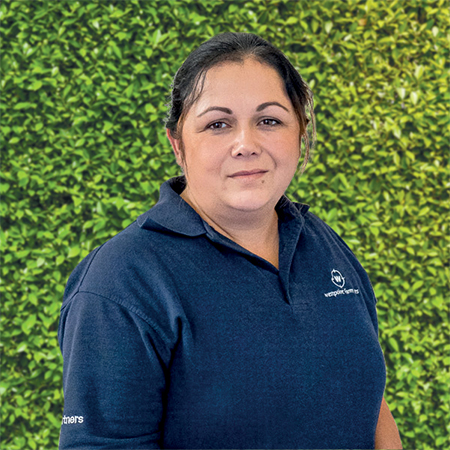
Spring and summer grazing provision will be needed when sheep are not in the vineyard, and you’ll need to register with a local farm vet. It’s also a good idea to sign up for a sheep keeping course if you’re a first-time keeper.
Health and welfare: Sharminda, who keeps 700 breeding ewes in Kent, recommends yearly vaccinations against clostridial disease, worming according to faecal egg counts and veterinary advice, and blowfly protection. Annual shearing will also be needed in early summer, so book a shearer in good time.
The three big health threats for sheep are fly strike, gut worms and clostridial disease, Kaz confirmed – but there’s no boilerplate health plan that will suit all farms, as it varies depending on the year, stocking density, location, climate and grazing history.
Kaz stressed the importance of having a proactive, rather than reactive relationship with your vet. Spending half an hour with them and getting a health plan will “save you a lot of money and heartache in the long run,” he added.
Copper toxicity: If copper compounds are being used to protect vines from fungal disease, there’s a risk of chronic copper poisoning in sheep. Copper is a ‘Goldilocks’ trace element, in the sense that there’s a narrow range between too much and not enough, Kaz said. Breed is one factor that affects copper requirements; for example, Texels are better at absorbing copper than Scottish Blackface, so require less to cause poisoning.
A recent study in France suggested overwintering sheep on copper-treated vines is reasonably safe if care is taken to leave time after harvest before introducing sheep and limiting the grazing season, Sharminda said. However, research into this area is ongoing. Any sickness or mortalities while grazing the vines should be investigated, and avoiding mineral buckets and additional feeds containing copper is sensible.

Your local vet can advise on breed selection, and also work out the amount of copper that’s likely being taken up by the sheep and how this relates to their daily requirements, Kaz noted.
Blood tests are also available to determine copper status.
Breeding: Lambing can be a severe pinch point in terms of expertise and potential complications, so running a non-breeding (‘dry’) flock – e.g. groups of ewes and wethers (castrated males) – is advised. Should you decide to run a breeding flock, it’s worth attending a lambing course and spending time on a local sheep farm at lambing time for experience.
Also, consider the additional costs and management practices – sourcing a ram, where to lamb, grazing requirements, and the plan for the young stock males, Sharminda concluded.
Read more fruit news
Read more vine news
